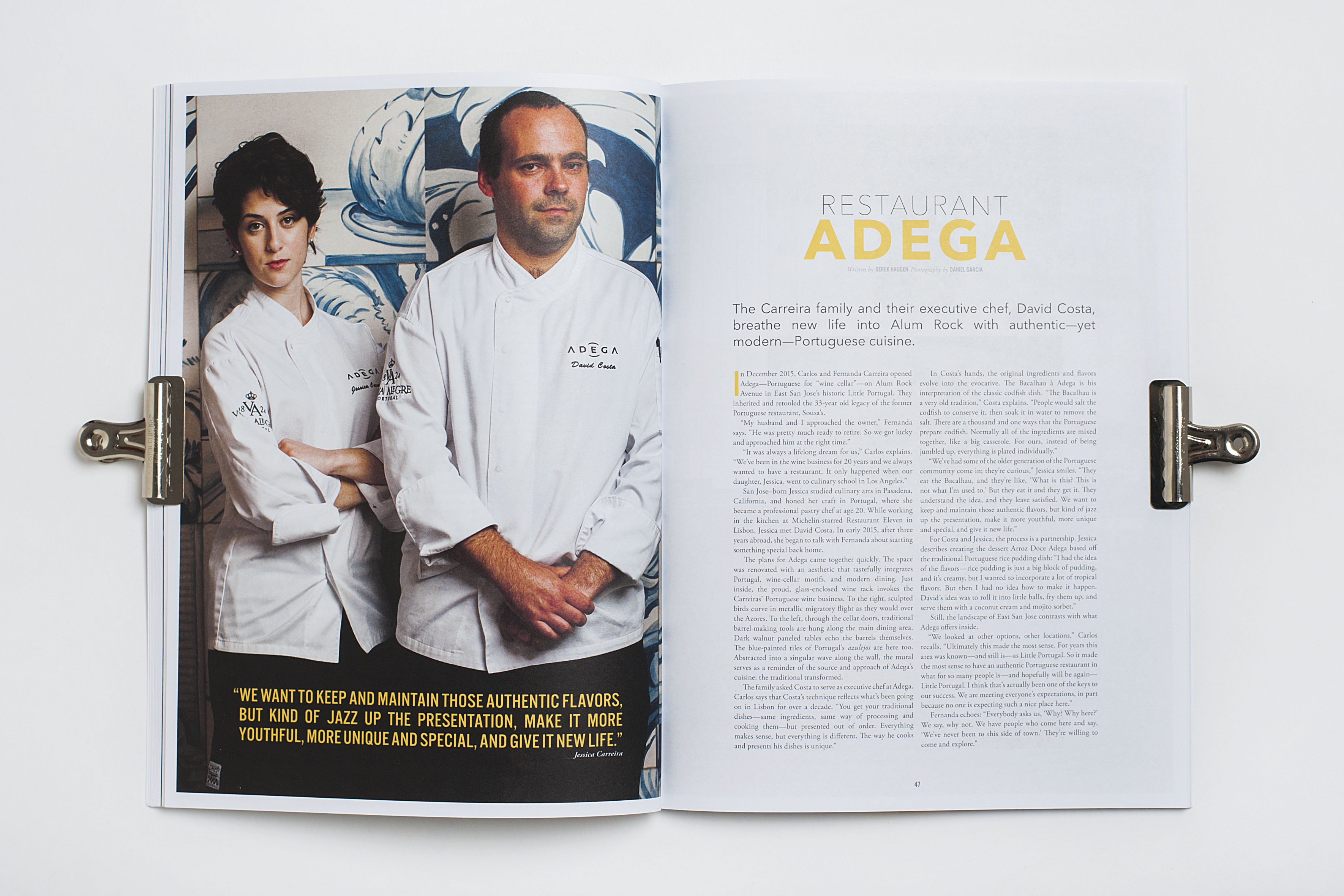
The Carreira family and their executive chef, David Costa, breathe new life into Alum Rock with authentic—yet modern—Portuguese cuisine.
In December 2015, Carlos and Fernanda Carreira opened Adega—Portuguese for “wine cellar”—on Alum Rock Avenue in East San Jose’s historic Little Portugal. They inherited and retooled the 33-year old legacy of the former Portuguese restaurant, Sousa’s.
“My husband and I approached the owner,” Fernanda says. “He was pretty much ready to retire. So we got lucky and approached him at the right time.”
“It was always a lifelong dream for us,” Carlos explains. “We’ve been in the wine business for 20 years and we always wanted to have a restaurant. It only happened when our daughter, Jessica, went to culinary school in Los Angeles.”
San Jose–born Jessica studied culinary arts in Pasadena, California, and honed her craft in Portugal, where she became a professional pastry chef at age 20. While working in the kitchen at Michelin-starred Restaurant Eleven in Lisbon, Jessica met David Costa. In early 2015, after three years abroad, she began to talk with Fernanda about starting something special back home.
“We want to keep and maintain those authentic flavors, but kind of jazz up the presentation, make it more youthful, more unique and special, and give it new life.”
The plans for Adega came together quickly. The space was renovated with an aesthetic that tastefully integrates Portugal, wine-cellar motifs, and modern dining. Just inside, the proud, glass-enclosed wine rack invokes the Carreiras’ Portuguese wine business. To the right, sculpted birds curve in metallic migratory flight as they would over the Azores. To the left, through the cellar doors, traditional barrel-making tools are hung along the main dining area. Dark walnut paneled tables echo the barrels themselves. The blue-painted tiles of Portugal’s azulejos are here too. Abstracted into a singular wave along the wall, the mural serves as a reminder of the source and approach of Adega’s cuisine: the traditional transformed.
The family asked Costa to serve as executive chef at Adega. Carlos says that Costa’s technique reflects what’s been going on in Lisbon for over a decade. “You get your traditional dishes—same ingredients, same way of processing and cooking them—but presented out of order. Everything makes sense, but everything is different. The way he cooks and presents his dishes is unique.”
In Costa’s hands, the original ingredients and flavors evolve into the evocative. The Bacalhau à Adega is his interpretation of the classic codfish dish. “The Bacalhau is a very old tradition,” Costa explains. “People would salt the codfish to conserve it, then soak it in water to remove the salt. There are a thousand and one ways that the Portuguese prepare codfish. Normally all of the ingredients are mixed together, like a big casserole. For ours, instead of being jumbled up, everything is plated individually.”
“We’ve had some of the older generation of the Portuguese community come in; they’re curious,” Jessica smiles. “They eat the Bacalhau, and they’re like, ‘What is this? This is not what I’m used to.’ But they eat it and they get it. They understand the idea, and they leave satisfied. We want to keep and maintain those authentic flavors, but kind of jazz up the presentation, make it more youthful, more unique and special, and give it new life.”
For Costa and Jessica, the process is a partnership. Jessica describes creating the dessert Arroz Doce Adega based off the traditional Portuguese rice pudding dish: “I had the idea of the flavors—rice pudding is just a big block of pudding, and it’s creamy, but I wanted to incorporate a lot of tropical flavors. But then I had no idea how to make it happen. David’s idea was to roll it into little balls, fry them up, and serve them with a coconut cream and mojito sorbet.”
Still, the landscape of East San Jose contrasts with what Adega offers inside.
“We looked at other options, other locations,” Carlos recalls. “Ultimately this made the most sense. For years this area was known—and still is—as Little Portugal. So it made the most sense to have an authentic Portuguese restaurant in what for so many people is—and hopefully will be again—Little Portugal. I think that’s actually been one of the keys to our success. We are meeting everyone’s expectations, in part because no one is expecting such a nice place here.”
Fernanda echoes: “Everybody asks us, ‘Why? Why here?’ We say, why not. We have people who come here and say, ‘We’ve never been to this side of town.’ They’re willing to come and explore.”
ADEGA RESTAURANT
instagram: restaurantadega
facebook: restaurantadega
twitter: restaurantadega
This article originally appeared in Issue 8.1 “Sight and Sound”


